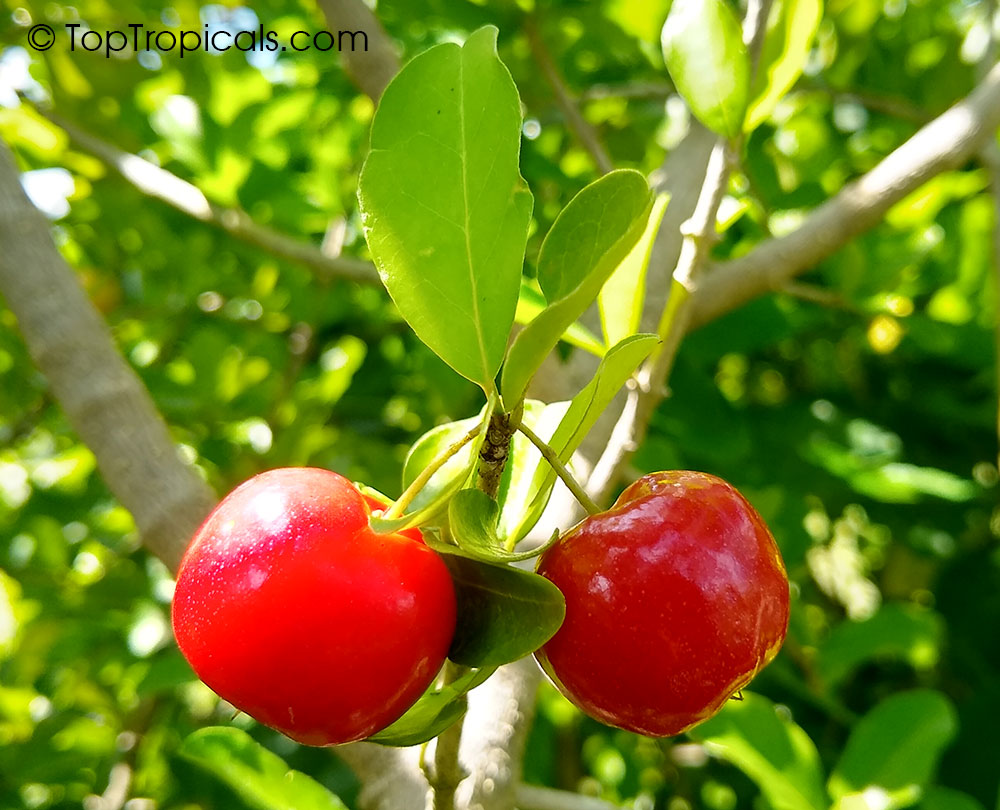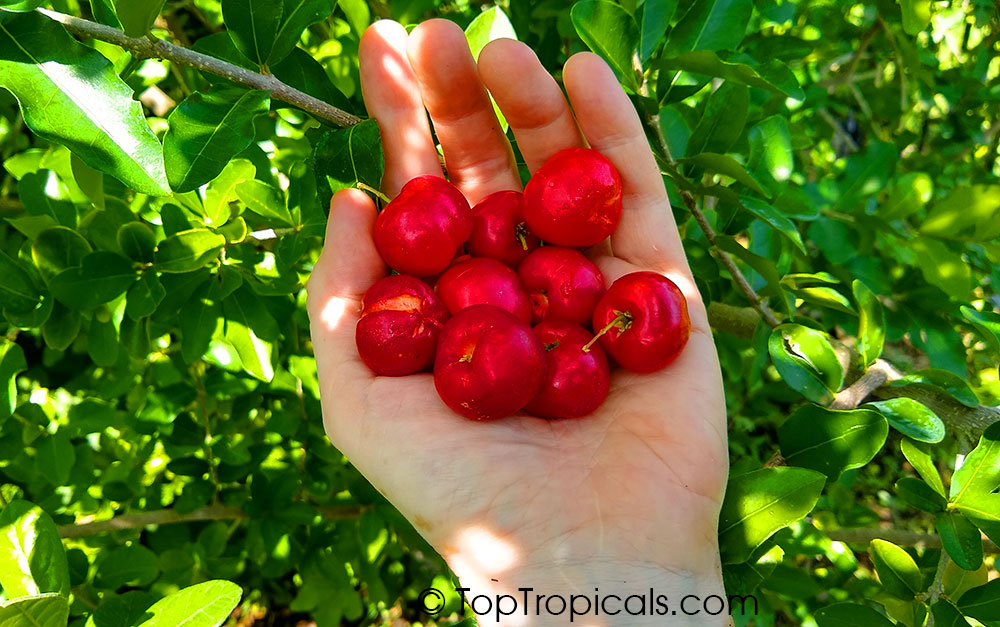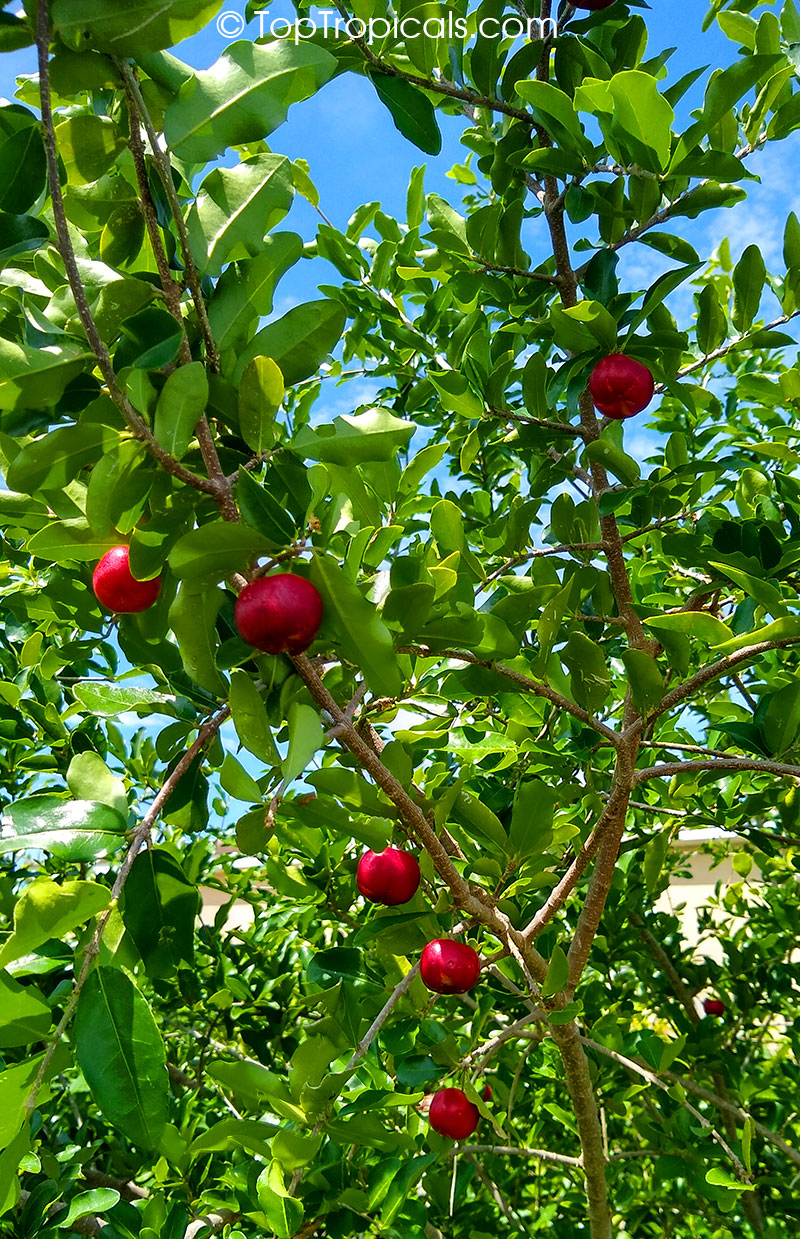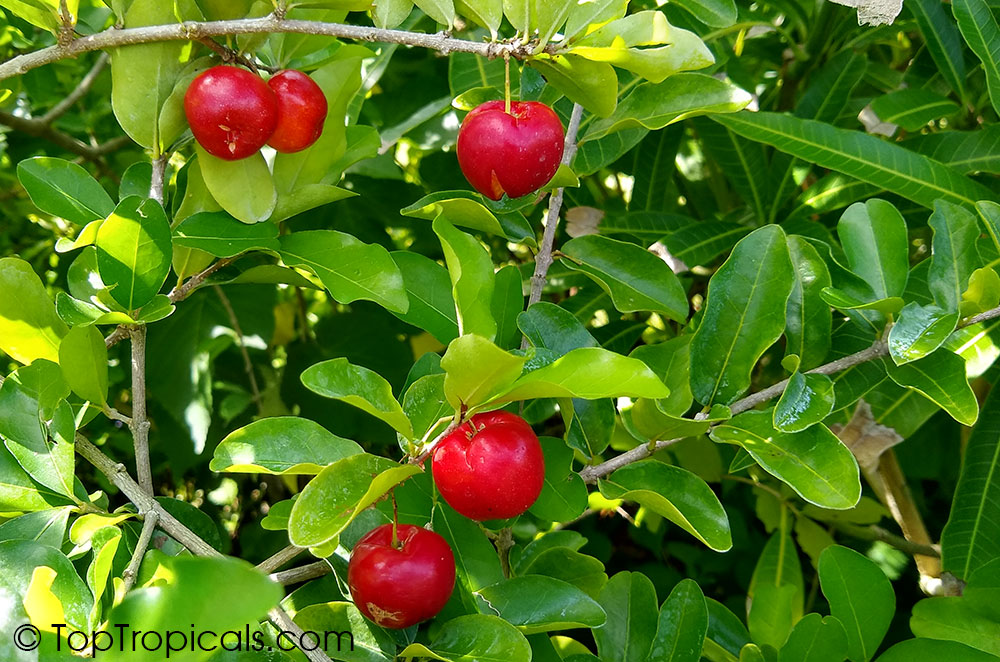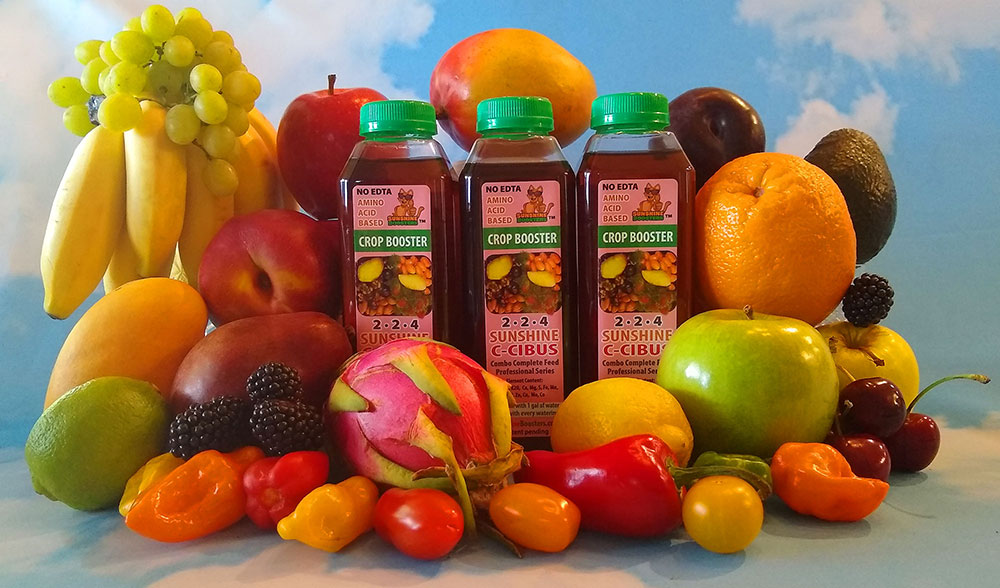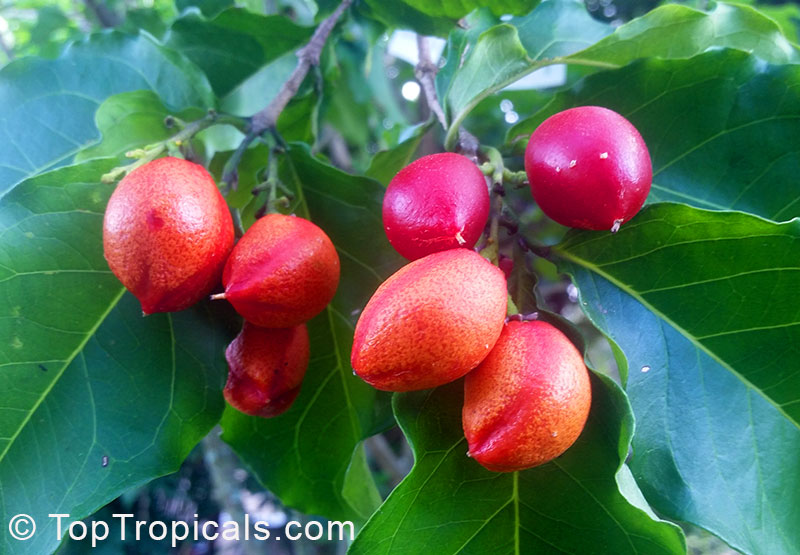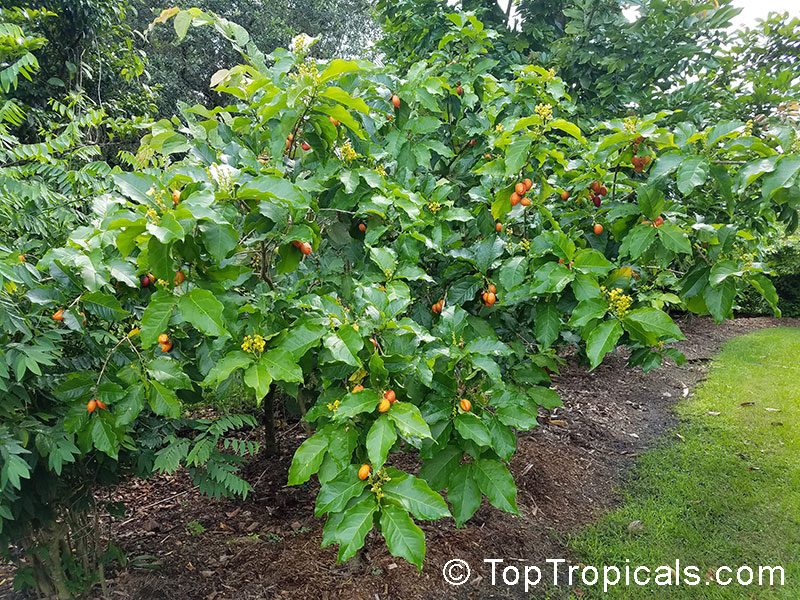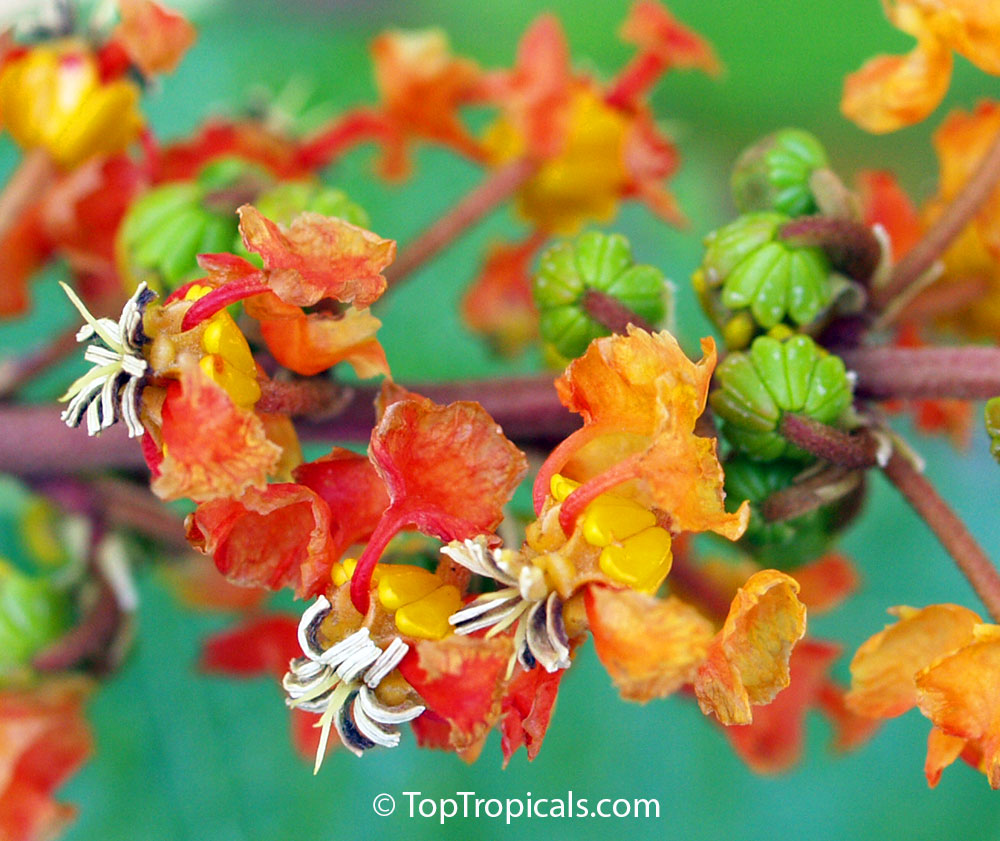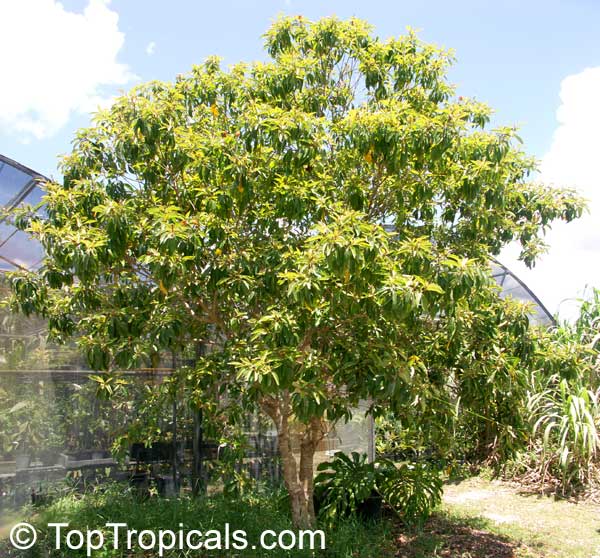Garden Blog - Top Tropicals
Date:
Barbados Cherry:
equal to 65 oranges!
by Alex Butova, the Witch of Herbs and Cats
...If you are looing for a low-growing tropical fruit tree that's quite
colorful in fruit and starts fruiting right away - plant Barbados Cherry...
...Small, bright red, berry-sized fruit has a vitamin C content up to 65
times that of an orange! A single fruit contains the minimum daily recommended
vitamin C requirements...
...Barbados Cherry is very easy to grow and is generally free of pests,
diseases, and any problems. It is drought tolerant and requires very little
care. And the best part is, it will fruit for you right away! As small as 2" tiny
plant can bear fruit!..
CONTINUE READING >>
Date:
NEW VIDEO:
Malpighia punicifolia - Dwarf Barbados-Cherry, Dwarf
Acerola. This dwarf form of Acerola makes a wonderful low-growing shrub or
beautiful bonsai tree with edible fruit. Profuse bloomer, it is also a nice
ornamental! Due to its shallow and smaller root system, Acerolas can be interplanted
with other crops more closely than many trees. Acerolas grows in marl,
limestone, clay and other heavy soils as long as it drains well. Has the highest
vitamin C content of any fruit. 1 Cherry is equal to 12 oranges. Used in
jellies, jams, freezes without losing its vitamin C content. The plant is drought
tolerant and easy to grow.
Malpighias are available from our store
Stay updated with TopTropicals Videos by subscribing to our channel at YouTube.com/TopTropicals and get our latest video news of what is fruiting and blooming!
Date:
Cold hardy tropical fruit trees for Zone 9
Q: Can you suggest tropical fruit that can be grown (cold hardy) in Zone 9?
A: There are quite a few tropical/subtropical trees that will
grow well in zone 9. Our favorites are:
Figs - very cold hardy and drought tolerant.
Loquats - grafted trees that start fruiting right away, reliable
producers.
Tropical Mulberry - very fast growing trees that can take freeze, heavy
producers.
Macadamia - these trees are of a compact nature, very easy to grow and
start producing nuts right away.
Many different varieties of Eugenias - tropical cherries - all-time favorites. Another tropical cherry - Malpighia, or Barbados cherry - starts fruiting in small size under one food tall! Great for containers.
Tropical (Low Chill) Peaches, Nectarines, and Plums. See full list of low-chill, relatively cold hardy fruit
trees.
And of course -
Bananas!
Don't forget to fertilize your fruit trees to improve their cold hardiness!
Date:
Plants for happiness and joy

Plants as homeopathic remedies and happiness boosters. Many people know about health benefits of vitamin C which improves and boosts our immune system similar to SUNSHINE plant booster stimulating growth of plants. But not everybody realizes that this vitamin is responsible for overall happiness of our body, it brings many systems in balance. A number of tropical plants used in salads, as well as fruit with high content of vitamin C can play dual role in your life. You can use them as food, as well as enjoy their beautiful tropical appearance. Such plants will help you feel interest and joy in life when you feel apathetic and resigned to the situation you are in. Just to name a few:
Lychee
Barbados Cherry
Eugenias
Hibiscus Karkade
Try them out. Stay healthy and happy!
Date:
Growing fruit trees in containers
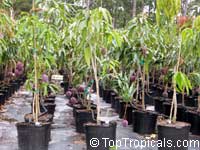
Will it fruit in a pot? YES!
Many tropical fruit trees can be grown in a pot. We get many calls from customers in cooler climates asking if our tropical trees can grow and fruit in a pot. The answer is yes!
Several plants fruit well in pots. Blackberries and raspberries, barbados cherries, blueberries and many more start fruiting even in their 1 gallon containers. We are especially excited about our new Pixie grapes, which are heavily laden with grapes even at only a foot long!
While some plants are small and will fruit easily in a container, others are large trees. For the tree type fruits, we recommend growing only non-seedling plants for pot culture. We have cuttings, air layers and grafted plants that are great options. These have the ability to fruit right away, as they are the same age as the parent tree. Some horticulturists recommend removing the first year fruit to allow the plant to focus on growth and establishing. If the plant is being kept in a pot, this is not necessary.
We also have several dwarf varieties of fruit trees that will thrive in a pot. For avocados, we carry the Wurtz variety which is a dwarf tree... read more...
Date:
Peanut Butter Fruit... tastes like peanut butter!
by Alex Butova, the Witch of Herbs and Cats
...One of the most fascinating exotic fruit, as amazing as Miracle fruit, Peanut Butter Fruit is loved by both kids and
adults... and yes, it tastes exactly like peanut butter!.. Yet it is much healthier food, with many medicinal benefits...
...The easy, low-maintenance Peanut Butter Fruit tree is essential for any
edible landscape, rare fruit collector, or tropical/subtropical garden. It has a great ornamental or
screening value. Also can be grown in container, and will fruit indoors... Similar to fast-fruiting Annonas, and its close relatives Malpighia
(Barbados Cherry) and Bursonima (Nancy Tree), Bunchosia tree starts fruiting in small size and at young age: 2-3 years from
seed!..
CONTINUE READING >>
Date:
Pretty Fancy Nancy from Brazil
Byrsonima crassifolia - Nancy Tree or Golden Spoon
by Alex Butova, the Witch of Herbs and Cats
Once Dr. David Fairchild bought in Panama seeds of a fruit plant unknown to him, which looked a little like
Acerola (Malpighia). When he asked what it was called, the woman who sold the seeds
answered - Nance, wild cherries from Brazil! The famous horticulturist brought the seeds from Panama to the United States Department of Agriculture in 1899. A few of
his specimens still exist in private collections in South Florida...
Nancy Tree fruit are not only delicious, but also very useful, they are widely used by many local people for medicinal purposes and include all of Vitamins B,
Vitamin C, Vitamin K, Vitamin E, Calcium, Cooper, Iron, Magnesium, Manganese,
Phosphorus, Potassium, Sodium and Zink. The whole multi-vitamin prescription in
one fruit!..
